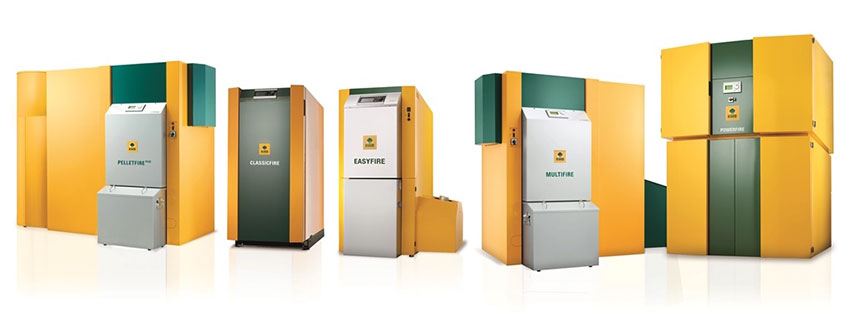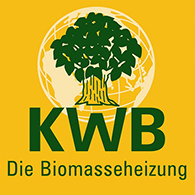At an event of the Catholic men’s movement, the researcher August Raggam and the locksmith and biologist Erwin Stubenschrott met. KWB was developed out of this meeting. When they founded the company in 1994 the goal of August Raggam, Erwin Stubenschrott and four other shareholders was to made a major contribution to the conversion of the energy supply of mankind to renewable energy and thus make the world more self-evident.
Everything started in Graz as a small four-man company. As an exhibitor at the Graz Spring Fair – wedged between concrete brick manufacturers – Erwin Stubenschrott and August Raggam were able to convince an HTL professor as the first pioneer. Today, KWB biomass heating employs 226 people at the St. Margarethen site and 160 other employees in 4 subsidiaries (Germany, Slovenia, Italy and France). Additional sales offices in Switzerland, the Netherlands, Great Britain, Ireland, Spain, Belgium, Canada and Chile – with exclusive sales partners are expanding our sales territory. The export share is already over 75%
KWB - the ideal solution for any application
From the low-energy single-family dwellings, residential buildings and commercial buildings to local heating systems, more than 66,000 customers are now supplied with KWB biomass heating systems throughout Europe. The product range includes pellet, wood chip and log heaters with a power range of 2.4 to 300 kW. Individual conveyor and storage systems complement the range and enable optimal coordination of KWB biomass heating with the building situation at the customer’s premises.
In the meantime, KWB is known for its innovative leadership in biomass. Whether with the first wood chip heating system with fully automatic heat exchanger cleaning, the development of the Unterschub firing system for pellet heaters or the development of the KWB caterpillar burner – an absolute world novelty – KWB always proves its innovative power. To ensure this in the future, the first research and development center was built in 2006, which has now become the largest private research center in the industry across Europe.
KWB takes responsibility
We are committed to becoming a socially and ecologically sustainable economic form as the largest employer in the municipality and on the basis of our vision “We give energy for life!” and our mission statement.
A special characteristic of this is found in company culture and, above all, in apprenticeship training. In addition to professional training, the building of social and emotional competence is a solid building block. The path to teaching can lead to a degree at KWB.
Products & Services
KWB Powerfire Hackgut- und Pelletheizung 150 – 300 kW
Quiet power pack for safe heating – Compact rotary grate burning system – Cyclone combustion chamber for lowest emissions – 240 liters of comfort ashtray
KWB Multifire Hackgut- und Pelletheizung 20 – 120 kW
Robust multitalent for economical heating – Stress-free combustion – Optimal heat exchange through high-efficiency turbulators – Crawler burners with high-alloyed and self-cleaning grate elements
KWB Pelletfire Plus Pelletheizung 45 – 135 kW
The robust pellet heating system for economical heating – stress-free combustion through variable grate speed and air supply – crawler burner with high-alloyed and self-cleaning grate elements made of cast iron
KWB Easyfire 2 Pelletheizung 2,4 – 35 kW
Simple and clean heating! – only 0.75 m² of floor space – mobile comfort ashtray – fits into every boiler room – emissions at the measurability limit
KWB Classicfire Stückholzheizung 18/28 & 40 – 50 kW
Classically and comfortably heat – Maximum comfort with long re-filling intervals thanks to the largest filling chamber in its class: 185 l for 1/2-meter logs and 1/3-meter logs transversely – with pellet burner from 2016 expandable with minimum effort
Success story
Innovative market leader for biomass heating systems
With its fully automated biomass heating systems, KWB has been focusing its business activities on the use of renewable and efficient fuels for years.
Heating with pellets, wood chips, firewood or even with olive kernels opens up new possibilities for the use of a wide variety of biomass types and also leads to considerable cost savings. By means of advanced testing facilities, the simulation and automatic biomass fuel detection are made possible by means of state-of-the-art equipment and thus the leadership role in the industry is further advanced.








